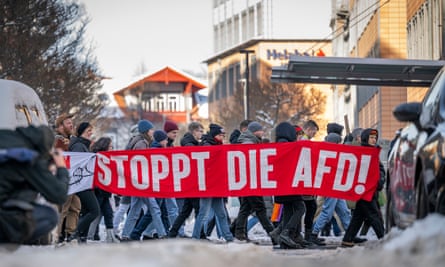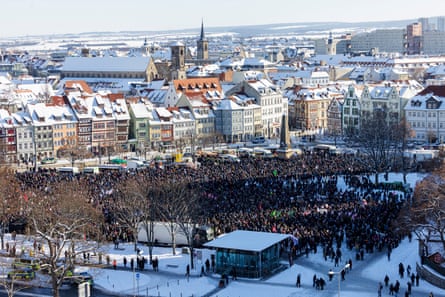More than 100,000 people turned out across Germany on Saturday in protest against the far-right Alternative für Deutschland (AfD) party, which sparked an outcry after it emerged that the party’s members discussed mass deportation plans at a meeting of extremists.
In Frankfurt, about 35,000 people joined a call under the banner “Defend democracy – Frankfurt against the AfD”, marching in the financial heart of Germany. A similar number, some carrying posters like “Nazis out”, turned up in the northern city of Hanover.
Protests were also held in cities including Braunschweig, Erfurt and Kassel and many smaller towns, mirroring mobilisation every day over the past week. In all, demonstrations have been called in about 100 locations across Germany from Friday through the weekend, including in Berlin on Sunday.
Politicians, churches and Bundesliga coaches have all urged people to stand up against the AfD.

The protests began after it emerged AfD party members had attended meetings with neo-Nazis and other extremists to discuss the mass deportation of migrants, asylum seekers and German citizens of foreign origin deemed to have failed to integrate.
Among the participants at the talks near the east German city of Potsdam was Martin Sellner, a leader of Austria’s Identitarian Movement, which subscribes to the “great replacement” conspiracy theory that claims there is a plot by non-white migrants to replace Europe’s “native” white population.
News of the gathering sent shock waves across Germany at a time when the AfD is soaring in opinion polls, just months ahead of three major regional elections in eastern Germany where their support is strongest.
The anti-immigration party confirmed the presence of its members at the meeting, but has denied taking on the “remigration” project championed by Sellner.
Leading politicians including Chancellor Olaf Scholz, who joined a demonstration last weekend, said any plan to expel immigrants or citizens alike amounted to “an attack against our democracy, and in turn, on all of us”.

He urged “all to take a stand – for cohesion, for tolerance, for our democratic Germany”.
Friedrich Merz, the leader of the opposition conservative CDU party, wrote online that it was “very encouraging that thousands of people are demonstrating peacefully against rightwing extremism”.
Besides members of the AfD, two members of the hard-right faction Werteunion of the CDU were also at the meeting near Potsdam cited by Correctiv.
Amid the outrage over the Potsdam meeting, the Werteunion’s leader Hans-Georg Maassen said on Saturday it had decided to split from the CDU. The group said it has about 4,000 members, many of whom were originally members of the CDU or the CDU’s Bavarian sister party CSU.
Formed in 2013 as an anti-establishment, anti-euro force by academics and economists, the AfD has quickly morphed into an anti-immigrant party, ditching its original founders.
It gained particular traction in 2015 when about a million migrants and refugees arrived in Germany, and the party entered the Bundestag for the first time in 2017, initially as the leading opposition party.
Its popularity has risen again since the Russian invasion of Ukraine, on the back of disgruntlement over high energy bills, food inflation, and what it sees as the high moral and financial cost of defending Ukraine.
With Agence France-Presse